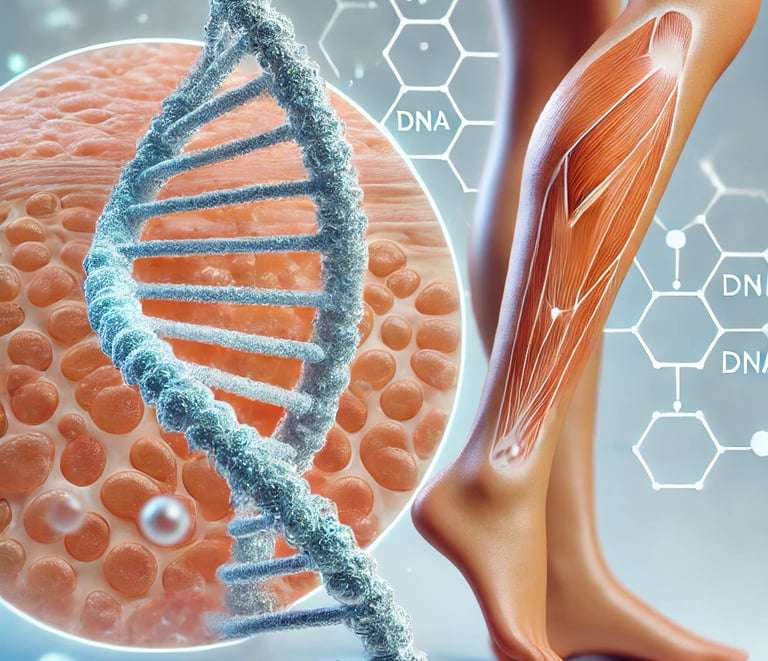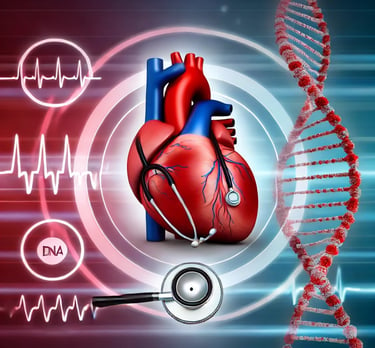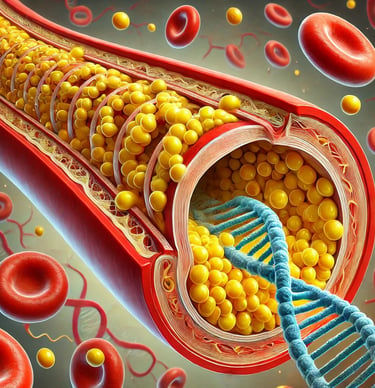PREVENTIVE GENETICS TEST




My Diabetes
Predisposition to diabetes: Type 2, MODY and pharmacogenetics
My Sarcopenia
Predisposition to sarcopenia: Loss of muscle mass and strength


Genetic predisposition to cognitive impairment


My Cardiovascular profile


Genetic predisposition to collagen-associated diseases
My Diabetes
GENETIC PREDISPOSITION TO DEVELOP DIABETES


MyDiabetes is a genetic test to identify your genetic predisposition to develop diabetes and to know your compatibility with the most common drugs in order to personalise your treatment.
MyDiabetes is a non-invasive test. The DNA is obtained from a saliva sample, which is completely painless and is suitable for any person of any age.
MyDiabetes requires only a single test, as genetics do not change throughout life.
MyDiabetes analyses genetic markers with scientific evidence.
Innovative technology for greater precision and depth in the results.
Once the sample has been received in the laboratory, you will receive your results within 20 days.
Who is MyDiabetes for?
MyDiabetes is recommended for anyone with diabetes or with a clinical suspicion of diabetes, as well as those with a family history of diabetes.
Your genetic profile does not change throughout life, so the MyDiabetes test can be taken by anyone at any age. It is recommended that a specialist evaluate and interpret the results in order to personalise your treatments.
What is pharmacogenetics?
Pharmacogenetics studies genetic variability associated with response to medication in order to optimise its safety and efficacy.
Having this genetic information helps determine the most appropriate medicine for each patient, adjusting more accurate and personalized doses for the therapies, increasing effectiveness and avoiding adverse reactions.




MyDiabetes is a genetic test that analyses genetic variants of more than 100 genes with scientific evidence in the characterisation of diabetes, and their segregation between:
Type 2 diabetes
Maturity Onset Diabetes of the Young (MODY)
Diabetes is a highly prevalent disease worldwide, with approximately 10.5% of the world’s adult population suffering from diabetes, of which 85-95% of all cases are diagnosed as type 2 diabetes. On the other hand, MODY is estimated at 1 in 1000 diabetics.
Knowing your genetics related to this disease allows to personalise prevention guidelines and the appropriate treatment for you.
YOU HAVE GENETIC PREDISPOSITION TO DEVELOP DIABETES?
DID YOU KNOW THAT 1 IN 2 ADULTS LIVING WITH DIABETES ARE UNDIAGNOSED?
What is MyDiabetes for?
MyDiabetes test determines the presence or absence of genetic variants associated with the different types of diabetes analysed. This genetic information allows:
Identifying the genetic predisposition to develop and discriminate between type 2 diabetes and MODY type diabetes.
Finding out your pharmacogenetic compatibility with the most commonly used drugs in the treatment of diabetes.
Personalise habits according to the needs of each individual based on their genetics to minimise the development or impact of this pathology.

Type 2 diabetes
Type 2 diabetes is characterised by a slow development of the disease, which is why it is usually diagnosed in adults. The origin of this disease is multifactorial, with both genetics and environment playing an important role in its development. Type 2 diabetes can be caused mainly by the disruption of three processes:
Reduced insulin sensitivity
Reduced insulin production
Increased insulin degradation
MODY diabetes
MODY (Maturity Onset Diabetes of the Young) is a disease characteristics very similar to those of type 2 diabetes, although MODY has a purely genetic origin. This test analyses the 9 most frequent subtypes of MODY in the population, each characterised by a mutation in a single gene, which may be:
HNF4A
GCK
HNF1A
PDX1
HNF1B
KLF11
BLK
ABCC8
KCNJ11
My Sarcopenia
Genetic Sarcopenia Test


MySarcopenia is a genetic test to identify the genetic predisposition to develop sarcopenia.
MySarcopenia is a non-invasive test. The DNA is obtained from a saliva sample, is completely painless and is suitable for any person of any age.
MySarcopenia is performed once in a lifetime, genetics does not change.
MySarcopenia analyses genetic markers with scientific validity.
Innovative technology that offers greater accuracy and depth in the results.
Once the sample has been received in the laboratory, you will receive your results within a maximum of 20 days.
What is MySarcopenia used for?
MySarcopenia is recommended for all specialists whose patients have symptoms associated with sarcopenia, related to loss of muscle mass and weakness, or have a family history of sarcopenia.
Sarcopenia-related measures
Sarcopenia can be influenced by the weakening of muscle capacities. The following measures, among others, are used to quantify this weakness:
Hand grip strength.
Percentage of muscle mass.
The genetic predisposition to suffer alterations in these aspects increases, in turn, the genetic predisposition to develop sarcopenia.




The MySarcopenia genetic test is a genetic test that analyses genetic variants involved in the characterisation of sarcopenia.
Sarcopenia is a disease associated with ageing, characterised by the accelerated loss of muscle mass and function. It is influenced by both genetic and lifestyle factors, and can develop even in middle-aged people.
Knowing the genetics related to this disease allows us to personalise prevention guidelines and the appropriate treatment for each person.
Do you have a genetic predisposition to develop sarcopenia?
Who is the MySarcopenia test for?
The MySarcopenia test determines the presence or absence of genetic variants associated with sarcopenia. This genetic information makes it possible to:
Identify the genetic predisposition to develop sarcopenia.
Personalise habits according to the needs of each individual based on their genetics to minimise the development or impact of this pathology.

Deterioro Cognitivo
Genetic profile of predisposition to cognitive impairment.


Genetic tests that allow identifying the genetic predisposition to develop Alzheimer's, Parkinson's and schizophrenia.
Non-invasive tests. DNA is obtained from a saliva sample, in a completely painless way and is suitable for any person and age.
It is done once in a lifetime, genetics do not change.
Analyze genetic markers with scientific validity.
Innovative technology that offers greater precision and depth in results.
Once the sample is received at the laboratory, you will have your results within a maximum period of 20 days.
Who is the test aimed at?
It is intended for medical specialists in the prevention, diagnosis and treatment of cognitive impairment, such as primary care physicians, neurologists and psychiatrists.
It is recommended to perform it for all those people who suffer from an associated disease or with clinical suspicion, as well as those who have a family history.
Genetic cognitive impairment profile
This profile evaluates genetic markers related to inflammatory diseases, offering crucial information to understand and adequately manage the following pathologies:
Alzheimer's
Parkinson's
Schizophrenia
Knowing the genetics related to these diseases allows us to personalize prevention guidelines and the appropriate treatment for each person.




Alzheimer's
Alzheimer's Disease (AD) is a type of dementia that causes the degeneration of brain neurons, with symptoms such as memory and learning loss. The development of Alzheimer's is due to:
The formation of amyloid plaques
Neuroinflammation processes
Cholinergic insufficiency
Mitochondrial dysfunction
Autophagy dysfunction



Parkinson's
Parkinson's Disease is a neurodegenerative disorder that occurs mainly in older age with a generalized slowing of movements and tremor or rigidity at rest. The development of Parkinson's is due to:
Dopaminergic degradation
Lewy body formation
Neuroinflammation processes
Schizophrenia
Schizophrenia is a serious mental disorder in which people interpret reality in an abnormal way. It can cause hallucinations, delusions and serious disorders in thinking and behavior, affecting daily functioning. The development of Schizophrenia is due to:
Alterations in brain development
Dopaminergic imbalance
glutamatergic imbalance
Serotonergic imbalance
Neuroinflammation processes


Perfil Cardiovascular


Genetic test that determines the genetic risk of a cardiovascular process.
It helps to better understand health, prevent and manage conditions related to the cardioendothelial-metabolic system, detect heritability and increase the effectiveness of treatments.
Non-invasive test. DNA is obtained from a saliva sample, in a completely painless way and is suitable for any person and age.
It is done once in a lifetime, genetics do not change.
Analyzes genetic markers with the highest level of scientific evidence.
Innovative technology that offers greater precision and depth in results.
Once the sample is received at the laboratory, you will have your results within a maximum period of 20 days.
Who is the test aimed at?
It is designed for medical specialists in the prevention, diagnosis and treatment of cardiovascular diseases, such as primary care physicians, cardiologists and pediatricians.
It is recommended to perform it for all those who suffer from cardiovascular disease or with clinical suspicion, as well as those who have a family history.
Cardiovascular genetic profile
This profile evaluates a selection of the markers with the greatest impact involved in the main pathologies associated with cardiovascular health, providing highly valuable information to the specialist for the diagnosis, prevention and treatment of the following conditions before the appearance of symptoms:
Cardiovascular disease
Hypercholesterolemia
Hypertension
Thrombosis-Thrombocythemia




Cardiovascular disease
Cardiovascular Disease (CVD) is the leading cause of death in Spain, representing almost 30% of total deaths. The detection of individuals at risk of developing cardiovascular diseases before the appearance of symptoms is essential for preventing the morbidity associated with this type of diseases and reducing the mortality caused by them.



Familial hypercholesterolemia (FH)
Familial hypercholesterolemia (FH) is a hereditary disease that is expressed from birth, and is characterized by an increase in cholesterol concentration, mainly of the LDL-C type.
Treatment guided by the causative gene.
Identification of family members at risk
Hypertension
It is the continuous or sustained elevation of blood pressure levels. To understand it better it is important to define blood pressure. The heart exerts pressure on the arteries so that they carry blood to the different organs of the human body. This action is what is known as blood pressure. The maximum pressure is obtained with each contraction of the heart and the minimum, with each relaxation.


Thrombosis and Thrombocythemia
Deep vein thrombosis (DVT) is a condition that occurs when a blood clot forms in a deep vein. These clots usually form in the lower legs, thighs, or pelvis, but they can also appear in the arm.
Thrombocythemia refers to a high platelet count that is not due to another health condition. This condition is often called primary or essential thrombocythemia.


DO YOU KNOW YOUR PREDISPOSITION IN THE CARDIOENDOTHELIUM METABOLIC SYSTEM?
Perfil de Colágeno


Genetic test that allows identifying the genetic predisposition to develop diseases associated with collagen due to a mutation in collagenases or an autoimmune disorder.
Non-invasive test. DNA is obtained from a saliva sample, in a completely painless way and is suitable for any person and age.
It is done once in a lifetime, genetics do not change.
Analyze genetic markers with scientific validity.
Innovative technology that offers greater precision and depth in results.
Once the sample is received at the laboratory, you will have your results within a maximum period of 20 days.
Who is the test aimed at?
It is intended for medical specialists in the prevention, diagnosis and treatment of collagen-related diseases, such as primary care physicians, rheumatologists and pediatricians.
It is recommended to perform it for all those people who have a clinical suspicion or family history of a disease associated with collagen.
Hereditary profile associated with collagen.
This profile evaluates the genetic markers related to collagen-associated diseases, offering crucial information that allows the specialist to prevent or reduce the impact of the following pathologies:
Osteoarthritis
Arthritis
Ankylosing spondylitis
Dermatomyositis
Systemic lupus erythematosus
Collagenopathy


Collagen-associated diseases
Diseases associated with collagen are those that affect the production, structure or integrity of this protein and, consequently, cartilage and bones, causing various disorders:
Collagenopathy: genetic diseases associated with mutations in any of the identified collagen genes, which affect the production of this protein
Osteoarthritis: Wear and tear of the cartilage that cushions the ends of the bones.
Arthritis: The immune system attacks the cartilage of the joints.
Ankylosing spondylitis: A disease that can cause some of the bones of the spine (vertebrae) to fuse.
Dermatomyositis: Chronic inflammatory disease, where an inflammatory myopathy may develop with cutaneous manifestations, and myositis (muscle inflammation) may or may not be present or may be systemic.
Systemic lupus erythematosus: Severe autoimmune disease that causes an irreversible loss of tolerance to altered molecular responses, especially an altered interferon signature, and activation of inflammatory pathways.



DO YOU KNOW YOUR PREDISPOSITION IN THE DISEASES ASSOCIATED WITH COLLAGEN?



Explanatory video of sample taking and use of devices.


